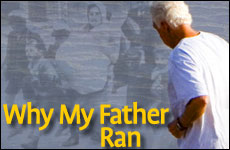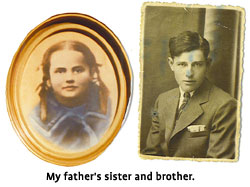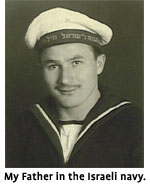 Identifying as a Jew
Identifying as a Jew


8 min read
My father began running when he was a young boy fleeing from the Nazis.
What compelled a 60+-year-old man, who had been diagnosed previously with blockages of his heart but refused surgery, to begin running marathons? Here is an excerpt of his story in his own words.
Bilgoraj, Poland: It was a beautiful summer day. Everything was wonderful; the birds were singing, the fields and gardens were dressed like a holiday in velvet green. Children were playing soccer on the field. But all at once, everything becomes very still. Suddenly, overhead in the sky are a few airplanes. The people in the street below start to panic and so it begins -- everywhere in town, people are talking about war. The drummer on the street begins to beat his drum and he relays the bad news... Germany declares war on Poland.
The next day, the city starts to mobilize --people, horses, cars, wagons, even bicycles. The people start to panic and become frightened. The stores become packed with people looking to buy bread and other products. The bread is beginning to disappear. The people are staying many hours on long lines for a piece of bread. The local Polish storekeepers do not want to sell products to the Jews.
We hear the sad news; Germany wants to occupy the port and the city and Poland is stubborn and trying to bargain with Germany. It doesn't take long and the Germans get occupation of the city. With a fast pace, the Germans go forward. In a short time, the Germans take city after city. People say the Germans are not far from Lublin. Great Polish armies come to Bilgoraj and they camp near the new school by the City Hall. Everybody is nervous.
 I sit with friends near the house and feed the pigeons and think how good it is for the pigeons. They have wings to fly wherever they want to, but we simple people must suffer through wars. But the time doesn't let me think for long; the fires begin. I run to the point of the roof of a local building; we see a great fire by the bridge and other streets that are burning. We don't see any firemen; only police running around like poisoned mice. They cannot stop the villagers from robbing the Jewish stores. Finally, the shop robbers are put onto wagons and taken away by the local police. The city Bilgoraj burns for three days.
I sit with friends near the house and feed the pigeons and think how good it is for the pigeons. They have wings to fly wherever they want to, but we simple people must suffer through wars. But the time doesn't let me think for long; the fires begin. I run to the point of the roof of a local building; we see a great fire by the bridge and other streets that are burning. We don't see any firemen; only police running around like poisoned mice. They cannot stop the villagers from robbing the Jewish stores. Finally, the shop robbers are put onto wagons and taken away by the local police. The city Bilgoraj burns for three days.
The unlucky Jews whose homes were burned go to live with relatives and friends. Three or four families live in a house with three rooms. And Jews thank God that they got away with their lives. And I, not even 13 years old, feel that a strong cloud would soon fall down.
Through all of this, the Jews do not lose their hope for a better tomorrow. But tragically, the town of Bilgoraj and so many other towns like it are devastated and emptied of almost all the Jews.
Where we were going we do not care, we just have to run.
My family, consisting of my mother, my little sister and two brothers, run. We board a train to leave Bilgoraj. Where we were going we do not care, we just have to run.
The trains are packed with people. Once we make it on to the train, it stops at a station and my brother says to my mother, "I am going down to get you some water." He leaves the train for just a few moments for some water and suddenly the train begins to move again. I cry out in vain, "Stop!! Stop the train! My brother is not back on...."
But the train leaves the station and my brother is left behind. He cannot catch the train. This was a terrible day, which I will never forget for the rest of my life. The image of my brother standing before my eyes, running to catch the train and watching him get further and further away. My mother begins to cry and that, too, is an image I will never forget.
My pen is too poor to describe my mother's sadness and pain. How much I try to give her hope that it would not take long for my brother to catch up with us and be reunited with her again is useless. I am too young to ease her pain – I feel helpless.
My other brother is hit by falling shrapnel and taken to a hospital, but we never see him again because we are running further and further away.
So days and weeks run by and it is just me, my mother and my little sister left on the train from our family.
We finally stop at a town where we believe the war has not yet come. We rent a small room -- just the three of us. But my mother is grieving so much from losing her two sons, so much that one day I say to my mother that I will leave to go find them and bring them home to her.
She replies with tears in her eyes, "I lost two sons and now you want me to lose you too?" But, in my young mind, I think differently. In my mind I want to rescue my family from the town before the Germans came in. I did not understand nor did I ever think for a moment that I would never see my family again.
I beg my mother so much until she finally relents and says to go in good health and come back right away with peace. On such a dark unforgettable night, I kiss my beloved mother and unforgettable sister goodbye and sneak on to a boat and run.
 I never do find my brothers – I run from one town to another – each time, the front getting closer. In the months following, I labor in coal mines in Siberia through hard winters, chop trees in the deep, thick forests, work in the fields from morning to night, and live with numerous families who are kind enough to take pity on a 13-year-old boy all alone.
I never do find my brothers – I run from one town to another – each time, the front getting closer. In the months following, I labor in coal mines in Siberia through hard winters, chop trees in the deep, thick forests, work in the fields from morning to night, and live with numerous families who are kind enough to take pity on a 13-year-old boy all alone.
Life goes on. The war finally ends and I want to return to Bilgoraj to find my family. I see some passing soldiers and they ask me where I am headed. I tell them I am returning to Bilgoraj to find my family. They say do not go back to Poland -- you will not find anyone. You will find only ruins... you will not find anybody that you once knew alive.
So I run again -- through Czechoslovakia, Austria, Italy, Israel, Cyprus, Israel and finally America.
I run because they could not.
I eventually marry and have two children of my own and years later, I get the news that I have heart trouble and blockages that could end up causing a stroke or worse. I am told that I need an operation and begin to lose all hope. Fear sets in. I pray to God and ask Him to help me. Then I make an immediate decision -- I will not lose my faith! I will face this with courage, as I have had to do so many times before.
I begin to walk a little at a time, and each time I think of my friends and family I left behind so long ago and imagine them walking beside me. Each day I walk a bit farther and farther until one day I see some marathoners running and I ask them where they were going. They say they are in a race and tell me the direction they are headed. So I begin to run along. As I run, I see the images of my mother and my family running beside me, so I run harder. Eventually, I finish the short marathon with the runners. The feeling of pride and accomplishment are so strong, I decide to run a little each day. Each time I run, I picture a different friend or family member that I left behind in Poland running alongside me. I run because they could not. I will continue to search for my family and keep running until I find them.
Dad continued his search for his family. He even returned to Bilgoraj in the 1990's but could not find them. He also continued entering and finishing marathons for many many years. He kept putting off the surgery but the need for it eventually caught up with him and in his mid 70's, he passed away. However, before my dad died, he had entered over 50 races and marathons and never stopped searching for his family.
"Everything disappeared like a dream." That is what my father wrote in his memoirs. Why My Father Ran is now published and available on Amazon. It is the riveting story of Sam Shatz - a holocaust survivor - who's motto was 'Never Give Up.' That is how he miraculously survived through the holocaust and how he lived his life after the war. Each survivor's story teaches us important lessons about who we are and each story must be told. Here is Sam's story. Visit www.whymyfatherran.webs.com to view photos and to see his DP Camp carvings. Click here for international orders.
